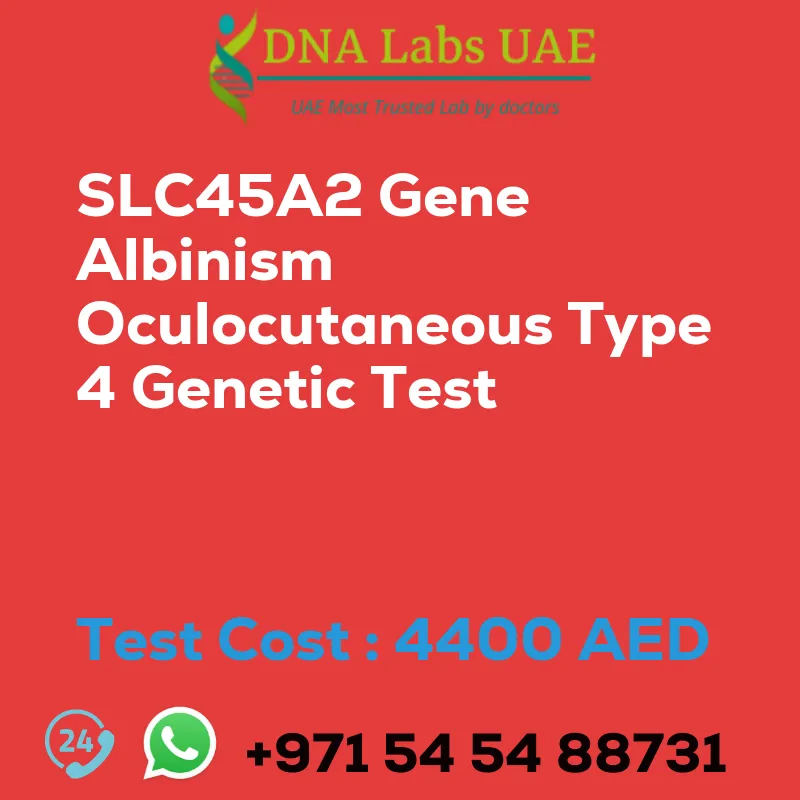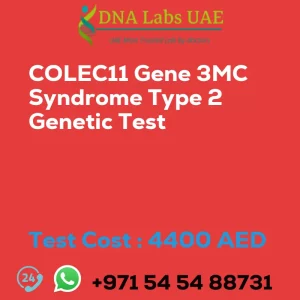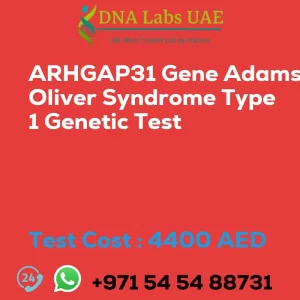SLC45A2 Gene Albinism Oculocutaneous Type 4 Genetic Test
At DNA Labs UAE, we offer the SLC45A2 Gene Albinism Oculocutaneous Type 4 Genetic Test to help individuals and their families understand their genetic makeup and potential risk for albinism. This test focuses on analyzing the SLC45A2 gene, which is responsible for producing a protein called solute carrier family 45 member 2.
Test Components and Price
The SLC45A2 Gene Albinism Oculocutaneous Type 4 Genetic Test is priced at 4400.0 AED. The test can be conducted using either a blood sample, extracted DNA, or one drop of blood on an FTA card.
Report Delivery
After conducting the test, the report will be delivered within 3 to 4 weeks.
Method and Test Type
The SLC45A2 Gene Albinism Oculocutaneous Type 4 Genetic Test utilizes NGS (Next-Generation Sequencing) technology. This advanced genetic testing method allows for the simultaneous analysis of multiple genes or even the entire genome. The test falls under the categories of osteology, dermatology, and immunology disorders.
Doctor and Test Department
The SLC45A2 Gene Albinism Oculocutaneous Type 4 Genetic Test is conducted under the supervision of a dermatologist. The test is performed in our Genetics department.
Pre Test Information
Prior to conducting the SLC45A2 Gene Albinism Oculocutaneous Type 4 Genetic Test, it is important to gather the clinical history of the patient. Additionally, a genetic counseling session may be conducted to draw a pedigree chart of family members affected by the SLC45A2 gene.
Test Details
Mutations in the SLC45A2 gene can lead to a condition known as albinism, oculocutaneous type 4 (OCA4). This type of albinism affects the eyes, skin, and hair, resulting in very light pigmentation. Individuals with OCA4 often experience vision problems such as reduced visual acuity, involuntary eye movements (nystagmus), and sensitivity to light (photophobia).
The NGS genetic testing method allows for the identification of mutations in the SLC45A2 gene, confirming a diagnosis of OCA4. This test involves obtaining a DNA sample, typically through a blood sample or cheek swab. The DNA is then sequenced using high-throughput technologies, generating a large amount of genetic data. This data is analyzed to identify any variations or mutations in the SLC45A2 gene associated with OCA4.
NGS genetic testing for OCA4 provides valuable information for individuals and their families. It confirms the diagnosis, offers genetic counseling, and provides guidance for management and treatment options. It also helps determine the risk of passing the condition on to future generations. It is important to note that genetic testing should be conducted under the guidance of a healthcare professional or genetic counselor who can provide appropriate counseling and interpretation of the results.
| Test Name | SLC45A2 Gene Albinism oculocutaneous type 4 Genetic Test |
|---|---|
| Components | |
| Price | 4400.0 AED |
| Sample Condition | Blood or Extracted DNA or One drop Blood on FTA Card |
| Report Delivery | 3 to 4 Weeks |
| Method | NGS Technology |
| Test type | Osteology Dermatology Immunology Disorders |
| Doctor | Dermatologist |
| Test Department: | Genetics |
| Pre Test Information | Clinical History of Patient who is going for SLC45A2 Gene Albinism, oculocutaneous type 4 NGS Genetic DNA Test. A Genetic Counselling session to draw a pedigree chart of family members affected with SLC45A2 Gene Albinism, oculocutaneous type 4 NGS Genetic DNA Test gene SLC45A2 |
| Test Details |
The SLC45A2 gene is responsible for producing a protein called solute carrier family 45 member 2, which is involved in the production and transport of melanin pigment in the body. Mutations in this gene can lead to a condition known as albinism, oculocutaneous type 4 (OCA4). OCA4 is a type of albinism that affects the eyes, skin, and hair. Individuals with OCA4 have significantly reduced or absent melanin pigment, resulting in very light skin, hair, and eye color. They also have vision problems, such as reduced visual acuity, nystagmus (involuntary eye movements), and photophobia (sensitivity to light). NGS (Next-Generation Sequencing) genetic testing is a type of genetic test that allows for the simultaneous analysis of multiple genes or even the entire genome. In the context of albinism, NGS genetic testing can be used to identify mutations in the SLC45A2 gene and confirm a diagnosis of OCA4. NGS testing involves obtaining a DNA sample, typically through a blood sample or a cheek swab. The DNA is then sequenced using high-throughput technologies, which can generate a large amount of genetic data. This data is analyzed to identify any variations or mutations in the SLC45A2 gene that may be associated with OCA4. NGS genetic testing for OCA4 can provide valuable information for individuals and their families, including confirmation of the diagnosis, genetic counseling, and guidance for management and treatment options. It can also help in determining the risk of passing the condition on to future generations. It is important to note that genetic testing should be conducted under the guidance of a healthcare professional or genetic counselor who can provide appropriate counseling and interpretation of the results. |








